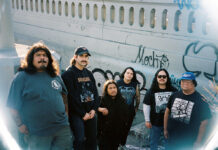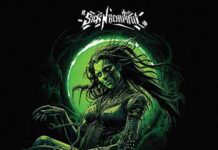
INTERVIEW WITH RIKARD ZANDER BY SAMMIE STAR
PHOTOGRAPH BY PATRIC ULLAEUS
It’s remarkable to see how Evergrey’s 30 years of existence in the music industry has led to boundless creativity across 13 albums. Now, with the release of their 14th album, Theories of Emptiness, the band has delivered their most dynamic work yet, while staying true to the dark and emotional instrumental pathos that has defined its sound.
Whether delving into their dark and aggressive side first introduced on their 1998 full-length, The Dark Discovery, or embracing the tenebrous and melodic elements of A Heartless Portrait, Evergrey creates immersive moments that resonate with longtime fans and new listeners. For Theories of Emptiness, that same creative passion and drive still bleeds through today, says keyboardist Rikard Zander.
“WE HAD ALL THESE NEW IDEAS TO WORK WITH. THAT’S WHAT MAINLY MAKES THIS NEW RELEASE A LITTLE BIT DIFFERENT.”
“We always try to find new angles for every album we make,” says Rikard. “We have been doing this for a long time and released a lot of albums. For us to feel fresh, we try to do things a little bit differently each time. Sometimes, it is hard to find those different angles, but on this particular album, it’s mostly because of our bass player Johan Niemann, who contributed to a lot of song ideas. He’s never done that before, so this gave it a fresh and new musical point of view. We had all these new ideas to work with. That’s what mainly makes this new release a little bit different. We are still Evergrey, and I hope to others we still sound like Evergrey.”
While the band has traveled into more somber and melodic territories throughout the years, Evergrey has always kept the core of their musical innovation at the forefront of the creative process, something that remains important to them during their long and diverse career.
“THERE IS SOMETHING REALLY PERSONAL ABOUT THE SOUND THAT COMES THROUGH”
“We worked with a new mixing guy this time around,” says Rikard. “We worked with Jacob Hansen for the past five albums. This was also something that we wanted to try—someone new, to have a new pair of ears to hear our music, something new and fresh. We succeeded with that, and we are really happy with the results. Instrumentally, we have always done things the same way, but what was a bit different this time around was that this was the first time we used a real Hammond organ. It was nice to finally use a real organ on an Evergrey album. Also, I have a really old piano in my apartment. This is also on the album. I set up two mics in the living room, recorded it, and it sounded really good. It was a nice experience because I didn’t need a professional studio or a grand piano. There is something really personal about the sound that comes through, so that was part of it as well.”
On Theories of Emptiness, Evergrey continues to weave a haunting tapestry of dark imagery, delving deep into themes of melancholy and isolation. The band’s exploration of these emotions drew them into a world of introspection.
“Tom Englund, our lead singer, writes 100 percent of the lyrics. The lyrics usually reflect his life or his emotions,” Rikard responds. “I have always liked Tom’s way of using words. English isn’t our native language, our language is Swedish. I always walk away impressed that he can express himself that well in the English language, and it’s also nice to hear from people who have English as their native language say he’s a good lyricist. It’s really cool and flattering.”
“WHEN THIS ALBUM WAS FINISHED, I HAD MIXED EMOTIONS ABOUT HOW THIS WAS GOING TO BE RECEIVED.”
Theories of Emptiness is an exploration of the inner self, delving into the feeling of despair that arises when life’s challenges seem insurmountable. This experience acknowledges that there are no definitive solutions to life’s problems, but rather aims to understand the deep and emotional struggles that accompany them. With such an introspective album, Rikard believes that through one’s innermost feelings, you can come out better and stronger than ever.
“When this album was finished, I had mixed emotions about how this was going to be received.” Rikard thoughtfully reflects. “I wasn’t sure how people were going to respond to the album, so I’m very surprised that people seem to like it that much. I really have enjoyed being a part of making it, but part of me was suspicious about how it was going to be received. So far, I haven’t heard a bad word about it. Also, the fact that Johan has written this much on the album, it feels really good, because everyone in the band writes. He hasn’t written this much before. Now that we have another person that writes music for the band, it makes you want to start writing again. That’s a really good feeling to have as a band right now. There isn’t this pressure to be creative on that side of things, and it’s a good feeling.”



















